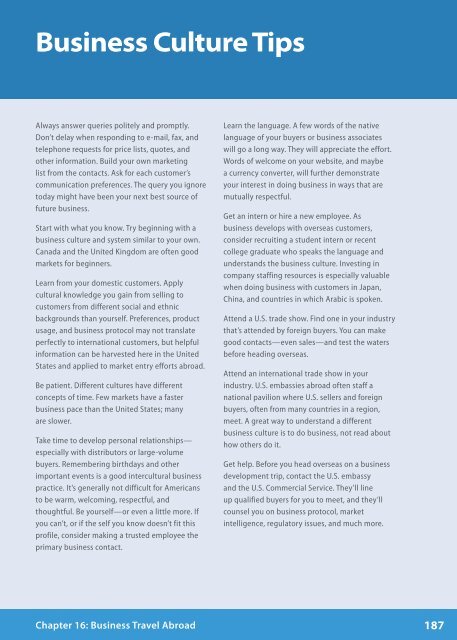basic-guide-to-exporting_Latest_eg_main_086196
basic-guide-to-exporting_Latest_eg_main_086196
basic-guide-to-exporting_Latest_eg_main_086196
Create successful ePaper yourself
Turn your PDF publications into a flip-book with our unique Google optimized e-Paper software.
Business Culture TipsAlways answer queries politely and promptly.Don’t delay when responding <strong>to</strong> e-mail, fax, andtelephone requests for price lists, quotes, andother information. Build your own marketinglist from the contacts. Ask for each cus<strong>to</strong>mer’scommunication preferences. The query you ignore<strong>to</strong>day might have been your next best source offuture business.Start with what you know. Try b<strong>eg</strong>inning with abusiness culture and system similar <strong>to</strong> your own.Canada and the United Kingdom are often goodmarkets for b<strong>eg</strong>inners.Learn from your domestic cus<strong>to</strong>mers. Applycultural knowledge you gain from selling <strong>to</strong>cus<strong>to</strong>mers from different social and ethnicbackgrounds than yourself. Preferences, productusage, and business pro<strong>to</strong>col may not translateperfectly <strong>to</strong> international cus<strong>to</strong>mers, but helpfulinformation can be harvested here in the UnitedStates and applied <strong>to</strong> market entry efforts abroad.Be patient. Different cultures have differentconcepts of time. Few markets have a fasterbusiness pace than the United States; manyare slower.Take time <strong>to</strong> develop personal relationships—especially with distribu<strong>to</strong>rs or large-volumebuyers. Remembering birthdays and otherimportant events is a good intercultural businesspractice. It’s generally not difficult for Americans<strong>to</strong> be warm, welcoming, respectful, andthoughtful. Be yourself—or even a little more. Ifyou can’t, or if the self you know doesn’t fit thisprofile, consider making a trusted employee theprimary business contact.Learn the language. A few words of the nativelanguage of your buyers or business associateswill go a long way. They will appreciate the effort.Words of welcome on your website, and maybea currency converter, will further demonstrateyour interest in doing business in ways that aremutually respectful.Get an intern or hire a new employee. Asbusiness develops with overseas cus<strong>to</strong>mers,consider recruiting a student intern or recentcoll<strong>eg</strong>e graduate who speaks the language andunderstands the business culture. Investing incompany staffing resources is especially valuablewhen doing business with cus<strong>to</strong>mers in Japan,China, and countries in which Arabic is spoken.Attend a U.S. trade show. Find one in your industrythat’s attended by foreign buyers. You can mak<strong>eg</strong>ood contacts—even sales—and test the watersbefore heading overseas.Attend an international trade show in yourindustry. U.S. embassies abroad often staff anational pavilion where U.S. sellers and foreignbuyers, often from many countries in a r<strong>eg</strong>ion,meet. A great way <strong>to</strong> understand a differentbusiness culture is <strong>to</strong> do business, not read abouthow others do it.Get help. Before you head overseas on a businessdevelopment trip, contact the U.S. embassyand the U.S. Commercial Service. They’ll lineup qualified buyers for you <strong>to</strong> meet, and they’llcounsel you on business pro<strong>to</strong>col, marketintelligence, r<strong>eg</strong>ula<strong>to</strong>ry issues, and much more.Chapter 16: Business Travel Abroad187





